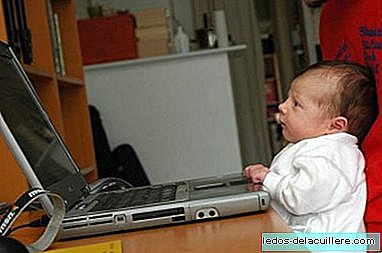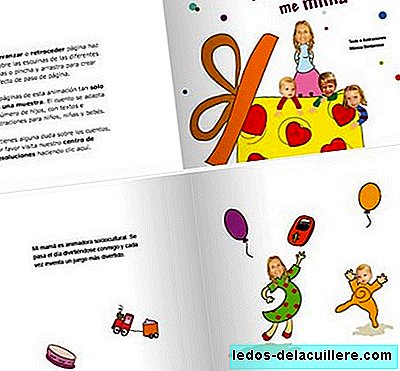
There is much talk about the cost of raising a child economically. Previous generations surely grew up with less than half of what we currently spend on our children. Partly because we are invaded by fierce publicity that creates superfluous needs and on the other hand because of how expensive life is.
It is true that parents want the best for our children, when the "best" for them is the love and attention that we can give them unconditionally, apart from a discipline based on understanding.
Following the report made by the Spanish Confederation of Organizations of Housewives, Consumers and Users, (which concluded that families spend between 100,000 and 300,000 euros to raise each child from birth to eighteen) was prepared a Decalogue for rational consumption in the care and education of children. With the dissemination of this Decalogue It is intended to contribute to overcome some trends in our consumption habits, such as the power of brands, excess consumerism, or premature incorporation into adult services, such as mobile telephony. 1.- Teach your children to consume rationally. Encourage them to reflect to avoid “overconsumption”: the eagerness for the superfluous (do you really need it?), The interest in the ephemeral (how much do you think will last?), Or the passion for brands (do you deserve Is it worth paying such a big price difference?). They will be less vulnerable to advertising pressures.
2.- Before advertising.- Make sure your children see the least amount of television advertising possible and explain that advertising offers a very limited view of the market. For example, in toy advertising, only four or five brands account for eighty percent of the ads that are issued. When deciding what to buy, make it easier for the "kids" to expand their choice options. Thus, in the purchase of toys, we can visit specialized stores where we will find dozens of original and attractive products that have never appeared on television.
3.- In the purchase of toys.- Try to prevent advertising (TV ads, catalogs ...) from becoming your sole source of information. Also, remember that toys should "serve to play": it is preferable to avoid those, perhaps most striking at first, but with few possibilities of play. In catalogs, pay attention to the "hook" prices of some items. In addition, it must be remembered that advertising is contractual, so the offers that appear in these brochures are required.
4.- Regarding video games, keep in mind that: • There are different equipment for video games. Either the personal computer (PC) or the game consoles. • Before choosing which equipment to use, consider the cost that each of the options will entail: the price of the games is different depending on whether they are for a computer or for a game console. Study, also, the cost of the different accessories you will need. • When buying a game, check if your equipment meets the minimum technical needs required for the game to function properly. • Evaluate, before acquiring it, the real possibilities of the game from which you are going to buy: Is it fun? Is it difficult to match the age of the child to whom it is intended?… • Keep in mind that there are factors that they make the price of the video game more expensive, as in the case of those related to premiere films, or with well-known brands (of toys, for example), without this implying a higher quality.
5.- Leisure.- When planning your leisure time, think about the large number of activities that are free: walks, excursions, some museums ... Take advantage, in shows and cultural visits, the discounts that are usually offered, such as the "days of viewer". Find out about the activities and workshops organized by your City Council or Autonomous Community, they are usually free or at a very low price, although your places may be limited.
6.- Back to school.- Check the equipment of the previous year, and reuse as much as possible. It is not reasonable to buy a new backpack or case if those of the previous year have been kept in good condition. It is not always essential to make the complete purchase of the return to school in September. We must remember that it is common for children throughout the course to change their size, or the material or equipment to be damaged: it may be convenient for them to begin the course with what has already been used and replace it in a few months.
7.- In the case of extracurricular activities, study if they are really suitable for the child before enrolling him. You should avoid overloading your day or urge you to take courses not suitable for your age or skills. From the economic point of view, it is advisable to consult with the City Council what activities program: its cost will be much lower.
8.- Clothing and footwear.- Opt for white brands, in dress and footwear. A branded polo shirt ranges between 30 and 50 euros. If it is not branded, its price is € 15 or even less. In any case you can choose different qualities and use the most common items for daily, or have them as "reserve".
9.- Pharmacy.- Rationalize your expenses in the pharmacy. Never give your child a medicine on his own. Remember that there are medicines of identical composition but with very different prices according to the brands. Finally, think that the sale in pharmacy does not guarantee, by itself, the effectiveness of a product: in hygiene products and cosmetics, or baby food, compare prices and qualities.
10.- Mobile telephony.- A mobile, in general, is not a necessary product for a child. In addition, the bill can be very high if the child or the young person makes calls to the numbers of additional charging services: they are the 803 -exclusive for erotic adults-, the 806 -ocio and entertainment contests, tarot, games, the 807- professional services technical, computer advice ... - and 907-Internet data services. Request the disconnection of these services (that is, they cannot be accessible from your child's mobile) by contacting your operator who will have to attend the request obligatorily within a maximum period of ten days.
Also, educate them to avoid calls to the other high-cost services (118XX - telephone information services, restaurant reservations, etc.), 905 (televoting, contests,), from which it is not possible to request disconnection. Finally, alert you to the so-called “premium SMS”: Avoid sending SMS (text messages) and MMS (multimedia messages: photos, music) to subscription services, alerts or downloads (logo downloads, melodies, alerts).












